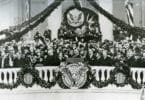Benjamin Harrison was born on August 20, 1833, in North Bend, Ohio. He was the second of eight children born to John Scott Harrison and Elizabeth Ramsey Irwin Harrison. Benjamin Harrison came from a prominent political family; his grandfather, William Henry Harrison, was the ninth President of the United States, and his great-grandfather, Benjamin Harrison V, was a signer of the Declaration of Independence.
Harrison’s early education was provided by private tutors and local schools. He later attended Farmer’s College near Cincinnati before transferring to Miami University in Oxford, Ohio. Harrison graduated in 1852, showing a strong aptitude for academics and public speaking.
Legal Career and Early Political Involvement
After college, Harrison studied law in Cincinnati under the guidance of Judge Bellamy Storer. He was admitted to the bar in 1854 and began practicing law in Indianapolis, Indiana. Harrison quickly established a successful legal practice and gained a reputation for his integrity and legal acumen.
In 1853, Harrison married Caroline Lavinia Scott, the daughter of a college president. Caroline, known as “Carrie,” was well-educated and shared her husband’s commitment to public service. The couple had two children, Russell and Mary.
Civil War Service
With the outbreak of the Civil War, Harrison joined the Union Army in 1862, initially as a second lieutenant. He quickly rose through the ranks, ultimately becoming a brevet brigadier general. Harrison’s leadership and bravery were evident in several key battles, including the Battle of Resaca and the Siege of Atlanta. His military service earned him respect and recognition, bolstering his political career.
Political Ascent
After the Civil War, Harrison returned to his legal practice but remained active in politics. He served as the reporter for the Indiana Supreme Court from 1864 to 1868. In 1876, he made an unsuccessful run for the governorship of Indiana but continued to build his political profile within the Republican Party.
Harrison’s political fortunes improved in 1880 when he was elected to the U.S. Senate. As a senator, he supported protective tariffs, veterans’ benefits, and the expansion of the Navy. Harrison’s commitment to these issues and his reputation for integrity made him a prominent figure in national politics.
Path to the Presidency
In 1888, Harrison was nominated as the Republican candidate for president. He ran against the incumbent, Grover Cleveland, in a hard-fought campaign. Although Harrison lost the popular vote, he secured a majority in the Electoral College, becoming the twenty-third President of the United States.
Presidency (1889-1893)
Economic Legislation
Harrison’s presidency was marked by significant economic legislation. One of the most notable acts was the McKinley Tariff of 1890, which raised tariffs to protect American industries from foreign competition. While the tariff was intended to boost domestic manufacturing, it also led to higher consumer prices and was controversial among voters.
Another important piece of legislation was the Sherman Antitrust Act of 1890, which aimed to curb monopolistic practices and promote fair competition. The act represented a significant step in the federal regulation of business practices, although its enforcement was initially limited.
Civil Rights and Voting Rights
Harrison was a strong advocate for civil rights and sought to protect the voting rights of African Americans in the South. He supported the Federal Elections Bill, also known as the Lodge Bill, which aimed to ensure fair elections and protect African American voters from intimidation and disenfranchisement. However, the bill faced strong opposition and ultimately failed to pass in the Senate.
Expansion of the Navy
A significant achievement of Harrison’s presidency was the expansion and modernization of the U.S. Navy. Recognizing the importance of a strong naval presence, Harrison advocated for constructing new steel-hulled warships. This effort laid the foundation for the emergence of the United States as a global naval power in the early 20th century.
Environmental Conservation
Harrison’s presidency also saw advancements in environmental conservation. He signed the Land Revision Act of 1891, which gave the president the authority to create forest reserves. Harrison used this power to set aside millions of acres of forest land for conservation, a precursor to the national parks system.
Personal Life and Character
Benjamin Harrison was known for his dignified and reserved demeanor. He was often described as a man of strong moral principles and deep religious faith. Harrison’s integrity and commitment to public service were central to his character and leadership style.
Harrison’s marriage to Caroline was a partnership built on mutual respect and shared values. Caroline was an active First Lady, supporting various social causes and overseeing the renovation of the White House. Tragically, she passed away from tuberculosis in 1892 during Harrison’s re-election campaign. Her death deeply affected Harrison and cast a shadow over his presidency.
Post-Presidency
After leaving office in 1893, Harrison returned to Indianapolis and resumed his legal career. He remained active in public life, lecturing and writing on political and legal issues. In 1896, Harrison remarried Mary Scott Lord Dimmick, the niece of his first wife. The couple had one daughter, Elizabeth.
Harrison continued to be involved in international affairs, serving as an arbitrator in the boundary dispute between Venezuela and British Guiana in 1898. His efforts in this role demonstrated his commitment to diplomacy and peaceful resolution of conflicts.
Harrison’s health began to decline in his later years, and he passed away from pneumonia on March 13, 1901, at the age of 67. He was buried next to his first wife, Caroline, in Crown Hill Cemetery in Indianapolis.
Legacy and Impact
Benjamin Harrison’s presidency is notable for its economic and legislative achievements, efforts to modernize the U.S. Navy, and promotion of civil rights. While his presidency faced challenges and controversies, his commitment to principle and public service impacted the nation.
Harrison’s advocacy for civil rights and voting rights, though unsuccessful in the short term, set the stage for future efforts to secure equal rights for all Americans. His support for antitrust legislation and environmental conservation also laid important foundations for future policies.
Interesting Aspects of Harrison’s Presidency
Centennial President
Harrison was inaugurated in 1889, exactly 100 years after George Washington took office as the first President of the United States. This coincidence earned him the nickname “Centennial President.” His presidency was marked by celebrations and reflections on the nation’s progress over the first century.
Electric Lighting in the White House
During Harrison’s presidency, the White House was equipped with electric lighting for the first time. The new technology was initially met with caution, and Harrison and his family were reportedly hesitant to use the light switches, fearing electric shocks. Despite this, introducing electric lighting marked a significant modernization of the executive mansion.
Benjamin Harrison’s life and presidency offer a compelling story of leadership, integrity, and dedication to public service. Harrison’s journey reflects his commitment to principle and reform from his early career as a lawyer and Civil War general to his time in the Senate and the White House.
While his presidency faced significant challenges, including economic controversies and civil rights struggles, Harrison’s efforts to modernize the Navy, promote fair competition, and conserve natural resources left a lasting legacy. His story is an enduring reminder of the importance of integrity, reform, and dedication to public service in achieving effective governance.
Read More:
Benjamin Harrison: The 23rd President by Charles W. Calhoun
This comprehensive biography by Charles W. Calhoun offers an in-depth look at Harrison’s life, political career, and presidency, highlighting his significant achievements and challenges.
Benjamin Harrison: Hoosier Warrior by Harry J. Sievers
This book, part of a three-volume series, provides a detailed account of Harrison’s early life, Civil War service, and political career before his presidency.
Benjamin Harrison: Centennial President by Anne Chieko Moore and Hester Anne Hale
This biography explores Harrison’s life and presidency, emphasizing his role as the Centennial President and his contributions to American politics and governance.
Benjamin Harrison: Young Tippecanoe by Howard W. Morgan
This book focuses on Harrison’s early life and career, providing insights into the experiences that shaped his leadership and political views.
The Presidency of Benjamin Harrison by Homer E. Socolofsky and Allan B. Spetter
This book examines Harrison’s presidency, focusing on his policies, challenges, and the impact of his leadership during a transformative period in American history.






